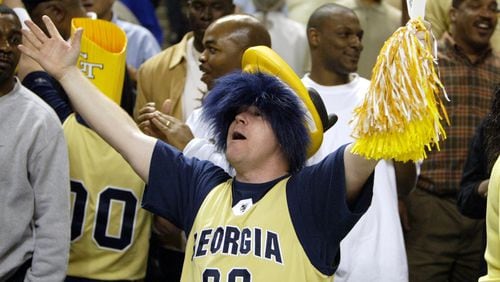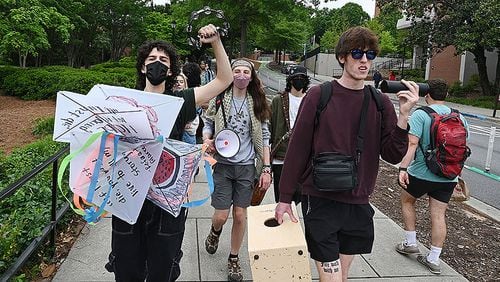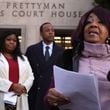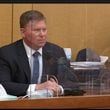Twenty years ago, a Georgia Tech men’s basketball team captured the hearts of its fans and exhilarated a city with a run to the 2004 national championship game, played April 5, 2004.
This is the first of a three-part series looking back on that team’s storied run to the Final Four in San Antonio as told by the players, coaches and other members of a team whose success has not since been matched at Tech.
Today’s installment revisits the Yellow Jackets’ undefeated start to the season before an overtime loss at Georgia ahead of ACC play. Tech beat No. 1-ranked Connecticut, won the preseason NIT and rose to No. 3 in the national rankings:
Coach Paul Hewitt: “We had a really good group of young men. Very intelligent, hard-working – all the cliches that apply to winning teams. But when you have a chance to experience it, it really is special to see it up close.”
Forward Isma’il Muhammad: “We used to, at the end of every practice, every game, you go into the huddle and you say, ‘1-2-3 family!’ That’s what pops in my head. We were truly a family. That’s why we still stay in touch to this day.”
Guard B.J. Elder: “Now that I’m a little bit older, I reflect back and I think about that team. Outside of us being a talented basketball team, I think about the character of that team and just how we matured and how we grew those first two years. A lot of people sometimes forget all the lumps we took our freshman and sophomore years. But looking back, it actually prepared us for what we were able to do those later years. Even to this day we’re still really pretty close. Whenever we have a chance to get together we all still come together and still have that family energy between each other.”
Center Luke Schenscher: “First thing I think of is the rough couple of years prior the core group had leading into that season. We took some really big beatings in games during my first two years. Preseasons and training were always super brutal, and it started to feel a little pointless after the two years. But all that body of work we were doing and the time spent together and playing together was a big part of why we did so well in ‘03-04 in my opinion.”
Radio play-by-play announcer Wes Durham: “That (2003-04) team was fun for a lot of reasons. It was fun because, unlike today’s college basketball, most of those guys had been there a couple years.”
Assistant coach Dean Keener: “Unselfish. I coached for 20 years, and there really was only one other team that I could tell you was as close and as connected and just were all about the right things.”
Hewitt: “It actually went back to the season before. I felt we ended the season on a pretty good note. And just felt like, especially with the emergence of Anthony McHenry, his ability to defend multiple positions, Luke Schenscher’s size, rim protection … it just felt like that team kind of had something. In the preseason, I remember watching a game, I can’t remember who it was, they were No. 3 in the country, but I remember watching that game, it was an early exhibition game on ESPN, and I came to the team the next day and I said, ‘If that’s the third best team in the country, trust me, we’re gonna be really good. We got a chance to do something really special this year.’”
Keener: “Spring of ‘03, Chris Bosh declared for the NBA draft. Shortly thereafter Ed Nelson left to transfer. They were back-to-back rookies of the year in the ACC. I think a lot of people, maybe not internally at Georgia Tech, but certainly outside of the athletic department felt like, ‘Man, did Tech miss their window with Bosh?’ Or ‘What’s left?’ What I think people forgot was the talent that remained in Elder and Muhammad and (Jarrett) Jack. And Schenscher made the next step.”
Muhammad: “We used to play pickup ball all the time, and we knew after losing Chris Bosh and Ed Nelson a lot of people kind of wrote us off. But we knew how competitive the pick-up games were. I remember myself, B.J., Jarrett, Anthony McHenry were sitting in a room and we were like, ‘Hey man, we got a chance to be one of the best teams in the country. We got that kind of talent.’ No one else thought so. I think we were preseason ranked No. 7 in the ACC that year, maybe? We weren’t on anyone’s radar in the nation, not even in the ACC. But our core group believed we could do something special. I think that’s one memory. It didn’t just happen. We called it out beforehand.”
Schenscher: “Personally I remember starting off quite poorly. My confidence was shot from my previous two years playing limited minutes, and it took me a few games to get my head straight and realize there wasn’t three bigs lined up on the bench to replace me if I make a mistake. Once that sunk in, I was able to play more freely and not worry so much about getting dragged. I felt like we were really comfortable with each other as a team and accepted each other for our differences. We were aware of each other’s strengths and consciously played to them. Coach Hewitt and the coaching staff were always very clear on the game plans and did an incredible job of scouting and figuring out ways to make teams uncomfortable playing us.”
Guard Marvin Lewis: “We played in the preseason NIT, which was hosted in Madison Square Garden, and we had a great game against UConn and a great game against Texas Tech. And after that weekend we truly believed and knew we had something special. Everyone knew their roles, everyone played to their potential and the results were there. We beat Top 25 teams, which hadn’t been done in a while. That, to me, was the biggest moment and what really propelled us throughout the rest of the season.”
Durham: “When they beat UConn that night, and Muhammad started with the dunks, it was unbelievable. The Garden, which was fully UConn fans when the night started, they just went crazy. They lost their mind when they saw Muhammad dunk it. People had not seen an explosive, 6-5, 6-6 guy physically get after it around the glass like that guy had. He was just a monster. He was an uber-athlete who could jackhammer the basketball.”
Keener: “About four, five, six games in, we all felt like, ‘OK, this has a chance to be a pretty special team.’”
Elder: “Starting out winning our first 12 and then going into UGA and losing a tough, double overtime game where we were ranked, maybe, third in the country? And losing to a team I think a lot of people thought we should beat, just how we responded to that loss. That just showed a lot of maturity as far as that group and just where we were mentally as a team. We dropped one that we probably shouldn’t have lost, but we bounced back by how we responded in practice, guys came in hungry ready to get back to what we were doing before.”
Student manager Graham Neff: “Clarence Moore had a shot, a 3-point shot on the wing to win it (at Georgia), and he missed it. And we lose. First loss. I distinctly remember the first practice after that game, Clarence comes out, and he goes to that spot on the floor, and the first shot he takes to start practice he makes it. He says something like, ‘All right, go time.’ Coach Hewitt was like, ‘It’s hoops, we lost, it’s all about how we respond.’”
Part 2: “I remember thinking, ‘Geez we are pretty bloody good.’”
About the Author







/cloudfront-us-east-1.images.arcpublishing.com/ajc/FTAF5ZMCDZD5ZJ5SZ2U3Z5O2VI.JPG)